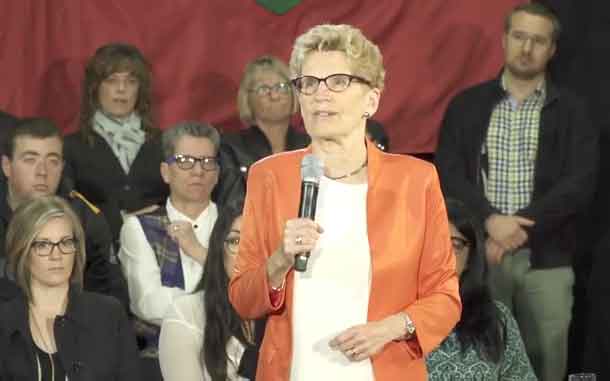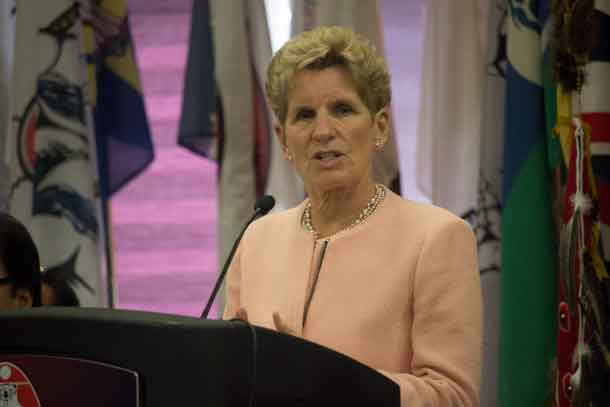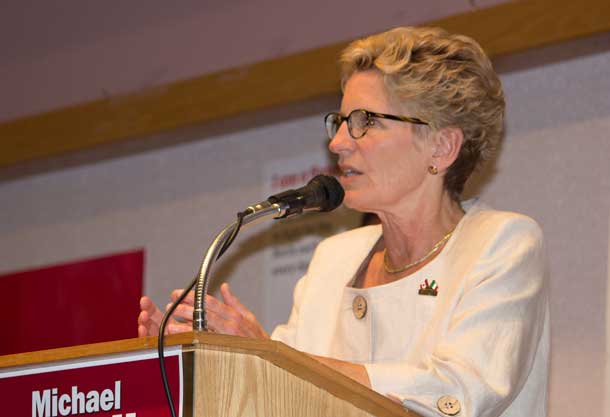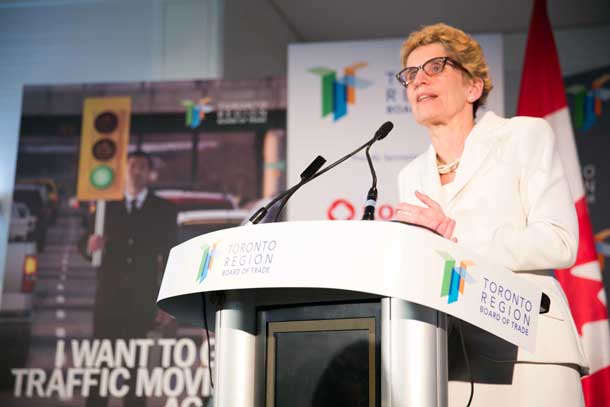THUNDER BAY – Ontario is launching a pilot project to assess whether a basic income can better support vulnerable workers, improve health and education outcomes for people on low incomes, and help ensure that everyone shares in Ontario’s economic growth. Three regions will take part in the study. Pilots will start in late spring in Hamilton, including Brantford and Brant County; and in Thunder Bay and the surrounding area. The third pilot will start by this fall in Lindsay.
Premier Kathleen Wynne announced details of the Ontario Basic Income Pilot (OBIP) project today at LiUNA Station in Hamilton. The three-year study will test how a basic income might expand opportunities and job prospects of those living on low incomes, while providing greater security for them and their families.
The project will be a three year test to see how the program will work. The Premier said that Ontario has achieved a balanced budget, and this is going to allow the investment in this project, and others.

Ontario’s economy is in a relatively strong position, however many people in the province are not feeling that growth in their everyday lives. People are struggling to keep up with the rising cost of living and facing “precarious employment” with little job security or benefits. This pilot will study whether a basic income can bridge that gap and give people the security and opportunity they need to achieve their potential.
The Basic Income model Ontario has developed will ensure that eligible participants receive:
♣ Up to $16,989 per year for a single person, less 50 per cent of any earned income
♣ Up to $24,027 per year for a couple, less 50 per cent of any earned income
♣ Up to an additional $6,000 per year for a person with a disability.
A basic income supports people to begin or continue working, or to further their education. Participants in the pilot will be able to increase their total income by combining a basic income with 50 cents from every dollar they earn at work.
“Everyone should benefit from Ontario’s economic growth. A basic income will support people in our province who are reaching for a better life. It gives people the security of knowing they can cover their basic needs and the ability to earn more through work. I believe this pilot is one way that government can be a force for good, and I am excited that Ontario is a leader in piloting this approach to help more people in our province get ahead and stay ahead,” says Kathleen Wynne, Premier of Ontario.
“The Ontario Basic Income Pilot will be testing a new approach to income support in a careful, step-by-step way to ensure we get it right. We are starting small, and using the lessons learned as we build the pilot out in further phases. Our goal is to better understand whether this approach could help people living on low incomes in their everyday lives,” adds Dr. Helena Jaczek, Minister of Community and Social Services.
Thunder Bay Mayor Hobbs – “This pilot will help…”
“A basic income will help lift so many vulnerable people out of poverty and strive for a better life, and we would like to thank Premier Kathleen Wynne and the Province for including Thunder Bay in this three-year study,” said Mayor Keith Hobbs. “I’d also like to thank Minister Michael Gravelle and Bill Mauro for their advocacy, and acknowledge the work of the Inter-Governmental Affairs Committee, my colleagues on City Council, and members of and stakeholders in the City of Thunder Bay for their contribution to this.”
Participants in the pilot will be able to increase their total income by combining a basic income with 50 cents from every dollar they earn at work. Those who earn less than the basic income amount through employment will receive regular payments to help them better afford basic needs such as housing and food.
The three test regions will host 4,000 participants eligible to receive a basic income payment, between the ages of 18 to 64. By late spring, people in these areas will begin receiving information about the pilot and how to participate.
“People are struggling to keep up with the rising cost of living, and this pilot will help determine whether a basic income can bridge that gap,” added Hobbs.
There needs to be a far reaching improvement in education stated the Premier. There are 100,000 new places in childcare, and improvements to open up educational opportunities.
“Every person struggling in poverty is a person denied the ability to reach for a better life. The Basic Income Pilot will help us test ways to make everyday life easier for Ontarians by removing barriers that still stand in the way of improved health, employment and housing for too many among us. Testing a Basic Income is just one way we’re working to ensure that every family has the dignity and security of a life free from poverty,” comments Chris Ballard, Minister Responsible for the Poverty Reduction Strategy.
Through this pilot, people who earn less than the basic income amount through employment will receive regular payments to help them better afford basic needs such as housing and food. The three test regions will host 4,000 participants eligible to receive a basic income payment, between the ages of 18 to 64. By late spring, people in these areas will begin receiving information about the pilot and how to participate. The province is partnering with these communities and other experts to make sure that the Ontario Basic Income Pilot is fair, effective, and scientifically valid.
Ontario is also in the early stages of planning a separate, parallel First Nations Basic Income Pilot, co-created and designed with First Nations partners.




